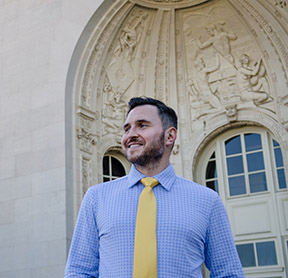November 2018 Newsletter
Why Your Support of the Jeri L. Whitfield Specialization Scholarship Fund Matters
- Law school graduates can easily be buried under mortgage sized loans of $150,000 or more.
- The starting salary for assistant district attorneys and public defenders is $40,366.
 One pressing challenge facing our criminal justice system today is the retention of qualified prosecutors and public defenders, who serve every day to ensure that our communities are protected, the rule of law is upheld, and the rights of the citizenry are safeguarded. Both prosecutor and public defender offices consistently find it difficult to attract and retain talented attorneys due to educational debt load. Attorney shortages in these offices can result in overworked staff handling unmanageable caseloads, potentially affecting public safety, the administration of justice, and ultimately the public's confidence in our justice system.
One pressing challenge facing our criminal justice system today is the retention of qualified prosecutors and public defenders, who serve every day to ensure that our communities are protected, the rule of law is upheld, and the rights of the citizenry are safeguarded. Both prosecutor and public defender offices consistently find it difficult to attract and retain talented attorneys due to educational debt load. Attorney shortages in these offices can result in overworked staff handling unmanageable caseloads, potentially affecting public safety, the administration of justice, and ultimately the public's confidence in our justice system.
- The starting salary for legal services lawyers is $42,000.
The loss of the Access to Civil Justice Act funds has severely impacted three primary civil legal providers in our state: Legal Aid of NC, Charlotte Center for Legal Advocacy, and Pisgah Legal Services. Reduced resources resulted in a significant reduction in service capacity and legal representation for thousands of North Carolinians. This cut not only impacts our citizens, but impairs judicial system accessibility, effectiveness, and efficiency. Attorneys must provide services to a growing number of clients without the resources to expand agency legal capacity. Assisting these lawyers seeking board certification recognizes their commitment to service and encourages them to continue to both serve underrepresented citizens and improve their knowledge and skills in their practice area.
"Being board certified has helped me be able to let victims in my cases (lots of violent felonies, child sex cases, felony DV, etc.) know that even though the defendant in their case might have a well-known, board certified specialist on their case, I am just as qualified and have met the exact same standards as defense counsel.”
Christon S. Halkiotis
Board Certified Specialist in State Criminal Law
Assistant District Attorney, 18th Prosecutorial District
"Being a criminal law specialist has given me a tangible attribute that shows that I care and know about the law, my continued professional development, and my clients."
Deonte' Thomas
Board Certified Specialist in State Criminal Law
Assistant Public Defender, Wake County
Spotlight Brian Hogan
Staff Attorney at the Greensboro Office of Legal Aid of North Carolina
 Brian Patrick Hogan is a staff attorney at the Greensboro office of Legal Aid of North Carolina. Legal Aid’s Greensboro office serves Guilford, Davidson, Montgomery, Randolph, Rockingham, and Rowan Counties with a staff of only 15 attorneys. Brian’s practice at Legal Aid focuses on serving clients with disabilities and victims of domestic violence.
Brian Patrick Hogan is a staff attorney at the Greensboro office of Legal Aid of North Carolina. Legal Aid’s Greensboro office serves Guilford, Davidson, Montgomery, Randolph, Rockingham, and Rowan Counties with a staff of only 15 attorneys. Brian’s practice at Legal Aid focuses on serving clients with disabilities and victims of domestic violence.
Brian received his law degree from the University of North Carolina School of Law and completed his undergraduate degree at UNC - Chapel Hill. After law school he worked as a staff attorney at Rubicon Programs in the San Francisco Bay Area, where he focused his practice on poverty law.
Upon returning to North Carolina, he volunteered pro bono with Legal Aid of North Carolina for several months and was subsequently hired by the Greensboro office. He is the first attorney at Legal Aid of North Carolina to be recognized as a specialist by the North Carolina State Bar. Brian was certified as a specialist in Social Security disability law in November 2017.
What led you to become a lawyer?
I am the first, and still only, lawyer in my family. As a young 24 year old entering law school, the practice of law was alien to me. Thus, I had thought it was a field worthy of study—study, that is, as an anthropologist. I had recently graduated from Carolina and was enamored by a group of sociologists and anthropologists, especially a sociologist named Bruno Latour who had been studying how scientists work through the methods developed by ethnographers. The story is a bit more complicated, as life is, but I decided that I wanted to go to law school to study how lawyers work. The end goal, at that time, was to then go on to graduate school to complete doctoral work in the anthropology of law.
After law school my wife and I moved to the San Francisco Bay Area for her medical residency at UCSF. While out west, still contemplating grad school and studying for the GRE, I accepted a position as a law clerk with a nonprofit agency, Rubicon Programs, which did poverty law in Richmond, CA, one of the poorest communities in the Bay Area.
Taking that “temporary” job at Rubicon changed my life, unexpectedly. I had the honor of working for some of the most compassionate, dedicated lawyers I know—lawyers who would treat a chronically homeless man suffering from psychosis with the same amount of respect and dignity that they would accord a sitting judge. My colleagues at Rubicon were not religious in any traditional sense, but they embodied an ethic toward others that resembled saintliness: a certain practical ethic of love and patience for their client, as well as equanimity when encountering her struggle. It was not how I envisioned the practice of law.
For the clients at Rubicon, the law (with its attendant regulations and administrative layers) was not an intellectual exercise, but a field that controlled their bare survival. The questions my clients asked were simple, yet so devastatingly (and maddeningly) complex: where am I going to sleep tonight; where am I going to get food tonight; where will I be safe tonight? I received a crash course in food stamps, SSI, TANF, unlawful detainers, repossessions, and protective orders during those first few months at Rubicon, and it changed me.
Ten years later it is still changing me. I am still here, a poverty lawyer, or at least still becoming one. I occasionally contemplate returning to graduate school one day, stepping outside the absurdity of abject poverty, and maybe achieving a different critical perspective or offering a larger solution to the basic questions that my clients ask. Works that achieve that possibility, like Evicted by Matthew Desmond and Punishing the Poor by Loic Wacquant, definitely inform what we do as a Legal Aid attorneys. Nonetheless, it is the day-to-day shared joys and frustrations that keep me coming back through that door at Legal Aid. At Legal Aid of North Carolina I have found a new community of compassionate, dedicated lawyers that nurture the continuous struggle for equal justice under the law, especially for the most marginalized and sometimes forgotten. What led me to become a lawyer doesn’t seem as relevant or interesting as what keeps me from just doing something else—it’s certainly not my poverty law salary. It is simple: it’s the clients, colleagues, and the shared hope that the world could be different, even if just slightly better for one person. I have become fond of telling people that I am fortunate to have a “dream job” (on most days). I appreciate that most people don’t have that privilege.
What made you decide to pursue certification?
The North Carolina Social Security disability law bar is exceptional in its level of expertise and community. We are lucky to have legends in the field here, like Charles T. Hall in Raleigh, and rising appellate stars, like Charlotte Hall in Raleigh. The Disability Advocacy Section of the North Carolina Advocates for Justice (NCAJ) is very active, as evident by its listserv and its annual CLE conferences. After attending my first NCAJ Disability Advocacy CLE in December 2015 and getting to know some of my fellow SSD practitioners, I realized that the most experienced, informed presenters and active participants on our listserv all identified themselves as being board certified specialists. They were lawyers I looked up to. To me, it just seemed like the next step to take in a practice area that I love and spend a majority of my time.
I have been fortunate to be a beneficiary of the charity of the North Carolina Legal Education Assistance Foundation (NC LEAF) during my career. NC LEAF provides me with loan repayment assistance every month, which allows me to be able to afford working for Legal Aid. I also was awarded a Jeri L. Whitfield Scholarship in 2017 by NC LEAF that covered the specialization application fee. The scholarship encouraged me to take the risk of investing resources studying for the exam. I am very grateful to NC LEAF, and especially to Esther Hall who runs the NC LEAF program.
What's the best thing about achieving that goal?
First, and surprisingly, it was a joy to study for and take the certification examination. It was rewarding to spend several weeks studying a topic that I already loved in such detail. Consequently, it was also rewarding to sit down for an examination feeling confident that you had developed a sufficient level of mastery over a substantive area of law.
In addition, at Legal Aid of North Carolina I can generally only take a fee-generating SSDI/SSI case if members of the private bar have turned down the case for representation. From an economic standpoint, it is entirely reasonable why a member of a private bar might turn down some of these cases. Nonetheless, for the prospective client it can be demoralizing. By the time an SSI applicant gets through my door, they have already been “rejected” by the Social Security Administration at two earlier levels of appeal. I like to think that when that demoralized prospective client comes through my door and sees the specialization certificate on my wall, they may have some hope again. Not hope about a potential outcome, but hope that they will have someone with a certain level of expertise by their side, knowing that they don’t have to go through this process alone. I appreciate that, for members of the private bar, that certificate may be a useful marketing tool, but for our clients that certificate means something different.
What is it like to work with clients seeking assistance with Social Security disability law issues in Greensboro?
The most difficult aspect of this practice is the unconscionable waiting time to get a case adjudicated before an administrative law judge. This issue is not unique to the Greensboro Office of Hearings Operations (OHO), and it is certainly not the administrative law judge’s fault. I know that OHO staff is just as frustrated as the bar. It’s an issue of resources and funding. This is just a rough estimate, but on average I’m seeing a two to three year wait, if not more, from application date to a written decision by an administrative law judge (note: before a claimant appears before an administrative law judge for a hearing, they have to be turned down at two earlier levels of adjudication). Our clients will generally fall deeper into poverty during this time. Such deprivation and stress takes an additional toll on our clients’ health. Unfortunately, some of our clients pass away before they receive a decision. Again, it can feel hopeless for the client.
What do you want non-Social Security attorneys to know about what you do?
Despite the above frustration, Social Security disability law is an immensely rewarding practice area. If your client’s appeal is successful, they will walk away with a tangible benefit that may allow them access to quality healthcare, that may put food on their table, and may allow them the possibility of resting their head somewhere safe at night. It’s that simple. In order to help your client attain that possibility, you will have to master a vast regulatory and subregulatory body of law, become intimately familiar with medical conditions and laboratory results, and become well-versed in vocational data. It’s worth it. This practice is about helping our clients maintain dignity in the face of suffering. Join the NCAJ Disability Advocacy Section, talk to the specialists, and when you’re ready, Legal Aid has plenty of clients that are looking for an attorney to volunteer their time to help them through this difficult period in their lives. It changed my life; it could change yours too.
You Can Help Public Interest Attorneys Seeking Specialization
Please Consider an End-of Year Gift in Honor of Public Interest Attorneys Seeking Specialization
 Lawyers who work in public service can qualify for a scholarship to cover the $250 application fee to become a board certified specialist. This scholarship fund is named The Jeri L. Whitfield Legal Specialization Certification Scholarship Fund in recognition of her service to the Specialization program. The scholarship is funded entirely by donations, and 100% of donations are used to support applicants. If you are interested in supporting this fund, please send a tax-deductible donation check to: Lanice Heidbrink, Board of Legal Specialization, The NC State Bar, PO Box 25908, Raleigh, NC 27611.
Lawyers who work in public service can qualify for a scholarship to cover the $250 application fee to become a board certified specialist. This scholarship fund is named The Jeri L. Whitfield Legal Specialization Certification Scholarship Fund in recognition of her service to the Specialization program. The scholarship is funded entirely by donations, and 100% of donations are used to support applicants. If you are interested in supporting this fund, please send a tax-deductible donation check to: Lanice Heidbrink, Board of Legal Specialization, The NC State Bar, PO Box 25908, Raleigh, NC 27611.